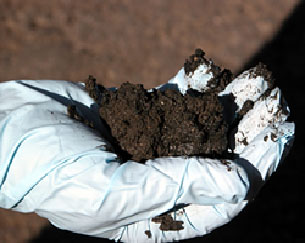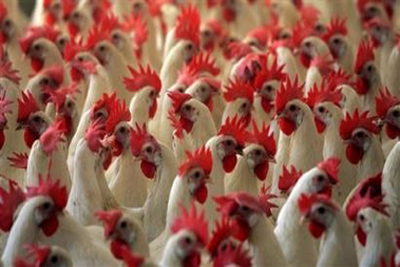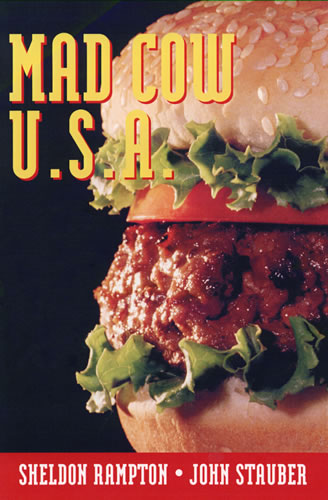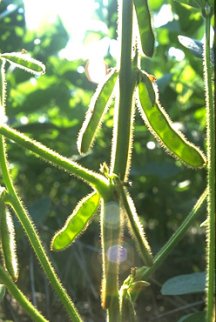ACSH Makes Alice Waters a Poster Child for Toxic Sludge
Submitted by John Stauber on
 The pesticide and chemical industry front group American Council on Science and Health is lauding organic gardens advocate
The pesticide and chemical industry front group American Council on Science and Health is lauding organic gardens advocate

Submitted by John Stauber on
 The pesticide and chemical industry front group American Council on Science and Health is lauding organic gardens advocate
The pesticide and chemical industry front group American Council on Science and Health is lauding organic gardens advocate
(NOTE: Visit the SourceWatch Portal on Toxic Sludge)
Fifteen years ago, the Center for Media and Democracy in my book Toxic Sludge Is Good for You first exposed the deceptive PR campaign by the municipal sewage industry that has renamed toxic sewage sludge as "biosolids" to be spread on farms and gardens. Unfortunately, the scam continues to fool more people than ever, even in San Francisco which is often dubbed the country's greenest city.
I suspect that Bay area celebrity chef Alice Waters would never dump sewage sludge onto her own organic garden, nor serve food grown in sludge in her world famous natural foods restaurant Chez Panisse. The mission of her Chez Panisse Foundation is to create "edible schoolyards" where kids grow, prepare, and eat food from their own organic gardens. But Francesca Vietor, the new executive director of the Chez Panisse Foundation, is at the same time actively promoting dumping toxic sludge on gardens in her role as Vice President of the San Francisco Public Utilities Commission.
Submitted by John Stauber on
Fifteen years ago, CMD's book Toxic Sludge Is Good for You! first exposed the hidden government and industry PR campaign greenwashing toxic sewage sludge as "biosolids," an invented PR euphe
Submitted by Anne Landman on
The National Cancer Institute has awarded a five-year, $2.7 million grant to Northeastern University Law School to research how the tobacco, fast food and sweetened beverage industries use and exploit the concepts of "personal responsibility" and "choice" to avoid liability and litigation for diseases that result from use of their products.
Submitted by Diane Farsetta on
"The ingenuity of the food manufacturers and marketers never ceases to amaze me," remarked author Michael Pollan. "They can turn any critique into a new way to sell food." Marketers are appropriating language from the "eat local" or "locavore" movement, which encourages support for small farms, sustainable practices and better treatment of animals.
Submitted by Judith Siers-Poisson on
The number of warning letters sent by the U.S. Food and Drug Administration to corporations has dropped by 50% in the last decade. In 2002, the regulatory agency decided that all warning letters should go through the office of its chief counsel, a move "designed to strengthen the letters and make them legally consistent and credible." But the change may have just succeeded in slowing the process to a crawl.
Submitted by Judith Siers-Poisson on
 The U.S. Department of Agriculture has found that Tyson Foods routinely gave antibiotics to chicken it raised to sell as meat, and labeled it as antibiotic free.
The U.S. Department of Agriculture has found that Tyson Foods routinely gave antibiotics to chicken it raised to sell as meat, and labeled it as antibiotic free.
Submitted by Judith Siers-Poisson on
 The global increase in grain prices may make the meat supply less safe. The European Union is considering a relaxation of feed bans that prohibit animal by-products being used as feed for other animals in the human food chain.
The global increase in grain prices may make the meat supply less safe. The European Union is considering a relaxation of feed bans that prohibit animal by-products being used as feed for other animals in the human food chain.
Submitted by Judith Siers-Poisson on
 The U.S. Department of Agriculture has been criticized for not totally banning "downer" cows -- animals "too sick or hurt to stand for slaughter" -- from the food supply. So "when a coalition of major industry groups reversed their position and joined animal advocates and several lawmakers in calling for an absolute ban," why wouldn't the USDA agree?
The U.S. Department of Agriculture has been criticized for not totally banning "downer" cows -- animals "too sick or hurt to stand for slaughter" -- from the food supply. So "when a coalition of major industry groups reversed their position and joined animal advocates and several lawmakers in calling for an absolute ban," why wouldn't the USDA agree?
Submitted by Judith Siers-Poisson on
 The biotechnology industry has invoked the need for genetically modified (GM) crops to meet the growing global food crisis.
The biotechnology industry has invoked the need for genetically modified (GM) crops to meet the growing global food crisis.
Center for Media and Democracy (CMD)
520 University Ave, Ste 305 • Madison, WI 53703 • (608) 260-9713
CMD is a 501(c)(3) tax-exempt non-profit.
© 1993-2025